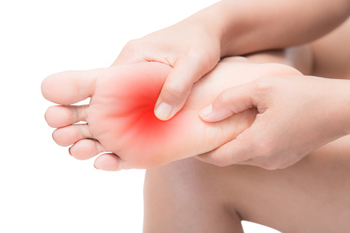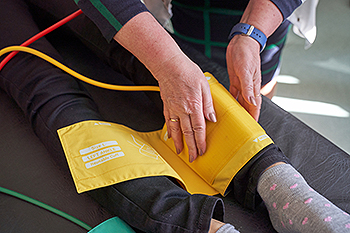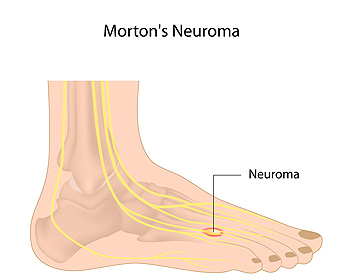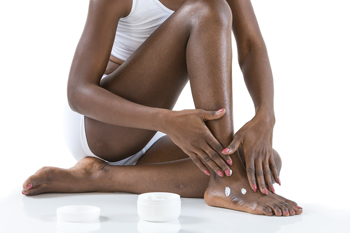Items filtered by date: December 2021
Why the Ball of Your Foot Feels Like It Is on Fire
Morton’s neuroma occurs when the tissue surrounding a nerve in the toes thickens in response to the nerve becoming entrapped, or otherwise irritated. This usually occurs between the third and fourth toes, however, it can also occur between the second and third toes. Morton’s neuroma can cause a burning pain in the ball of the foot. People with this condition sometimes explain the pain they feel as walking on a pebble or having a bunched-up sock in the front of their shoe. The toes may also feel numb or tingling, and there may be difficulty walking. Wearing shoes that are too tight or that compress your toes may sometimes contribute to the formation of Morton’s neuroma. This can include ski boots and ballet slippers too. Other foot dysfunctions that squeeze or put pressure on the toes can be contributing factors, such as flat feet, bunions, hammertoes, and high arches. Certain repetitive sporting activities may also be responsible. If you ever experience any of the symptoms mentioned here, call a podiatrist. They will examine you and run diagnostics to rule out other possible conditions and create a treatment plan to relieve pain and treat the underlying thickened tissue and nerve compression.
Morton’s neuroma is a very uncomfortable condition to live with. If you think you have Morton’s neuroma, contact Edward S. Pozarny DPM of Arlington Podiatry Center. Our doctor will attend to all of your foot care needs and answer any of your related questions.
Morton’s Neuroma
Morton's neuroma is a painful foot condition that commonly affects the areas between the second and third or third and fourth toe, although other areas of the foot are also susceptible. Morton’s neuroma is caused by an inflamed nerve in the foot that is being squeezed and aggravated by surrounding bones.
What Increases the Chances of Having Morton’s Neuroma?
- Ill-fitting high heels or shoes that add pressure to the toe or foot
- Jogging, running or any sport that involves constant impact to the foot
- Flat feet, bunions, and any other foot deformities
Morton’s neuroma is a very treatable condition. Orthotics and shoe inserts can often be used to alleviate the pain on the forefront of the feet. In more severe cases, corticosteroids can also be prescribed. In order to figure out the best treatment for your neuroma, it’s recommended to seek the care of a podiatrist who can diagnose your condition and provide different treatment options.
If you have any questions, please feel free to contact our office located in Arlington, VA . We offer the newest diagnostic and treatment technologies for all your foot care needs.
Arthritis Can Cause Pain in the Feet and Ankles
Understanding Charcot Foot
 Peripheral neuropathy occurs when there are damaged nerves in the extremities, including the feet. This neuropathy can lead to the weakening of the bones in the foot, which is often known as Charcot foot. When these bones weaken, fractures in the foot can be worse, and bones in the joints can collapse. Ultimately, Charcot foot can disable the foot by causing it to become deformed and potentially require amputation. Some symptoms of Charcot foot include a warmness to the touch of the foot, redness, swelling, and pain. Diabetic patients should also be more aware of Charcot foot because the neuropathy that often goes hand-in-hand with diabetes can lead to this condition as well. Patients who are struggling with neuropathy, or believe that they have Charcot foot, should consult with a podiatrist for a proper assessment of their condition.
Peripheral neuropathy occurs when there are damaged nerves in the extremities, including the feet. This neuropathy can lead to the weakening of the bones in the foot, which is often known as Charcot foot. When these bones weaken, fractures in the foot can be worse, and bones in the joints can collapse. Ultimately, Charcot foot can disable the foot by causing it to become deformed and potentially require amputation. Some symptoms of Charcot foot include a warmness to the touch of the foot, redness, swelling, and pain. Diabetic patients should also be more aware of Charcot foot because the neuropathy that often goes hand-in-hand with diabetes can lead to this condition as well. Patients who are struggling with neuropathy, or believe that they have Charcot foot, should consult with a podiatrist for a proper assessment of their condition.
Neuropathy
Neuropathy can be a potentially serious condition, especially if it is left undiagnosed. If you have any concerns that you may be experiencing nerve loss in your feet, consult with Edward S. Pozarny DPM from Arlington Podiatry Center. Our doctor will assess your condition and provide you with quality foot and ankle treatment for neuropathy.
What Is Neuropathy?
Neuropathy is a condition that leads to damage to the nerves in the body. Peripheral neuropathy, or neuropathy that affects your peripheral nervous system, usually occurs in the feet. Neuropathy can be triggered by a number of different causes. Such causes include diabetes, infections, cancers, disorders, and toxic substances.
Symptoms of Neuropathy Include:
- Numbness
- Sensation loss
- Prickling and tingling sensations
- Throbbing, freezing, burning pains
- Muscle weakness
Those with diabetes are at serious risk due to being unable to feel an ulcer on their feet. Diabetics usually also suffer from poor blood circulation. This can lead to the wound not healing, infections occurring, and the limb may have to be amputated.
Treatment
To treat neuropathy in the foot, podiatrists will first diagnose the cause of the neuropathy. Figuring out the underlying cause of the neuropathy will allow the podiatrist to prescribe the best treatment, whether it be caused by diabetes, toxic substance exposure, infection, etc. If the nerve has not died, then it’s possible that sensation may be able to return to the foot.
Pain medication may be issued for pain. Electrical nerve stimulation can be used to stimulate nerves. If the neuropathy is caused from pressure on the nerves, then surgery may be necessary.
If you have any questions, please feel free to contact our office located in Arlington, VA . We offer the newest diagnostic and treatment technologies for all your foot care needs.
Ways to Treat Peripheral Vascular Disease
 When someone experiences peripheral vascular disease, (also called peripheral artery disease, or PAD), the primary cause is a decrease of blood flow to a body part other than the brain or heart. This is usually caused by a buildup of fatty deposits in the artery. Most commonly it affects the legs, feet, and toes causing pain, cramping, numbness, tingling, coldness, and wounds that won’t heal. If left untreated it can lead to more serious conditions, including gangrene. Unfortunately, many symptoms often are noticed only after the condition has become serious. Risk factors include diabetes, obesity, smoking, and sedentary living. Several actions can help reduce symptoms, including managing diabetes and high blood pressure, losing weight, ceasing smoking, exercising regularly, and eating low-fat, high-fiber foods. If pain continues or gets worse, it is suggested that you consult a podiatrist who can review medical treatment and surgical procedures available to widen the blood vessels.
When someone experiences peripheral vascular disease, (also called peripheral artery disease, or PAD), the primary cause is a decrease of blood flow to a body part other than the brain or heart. This is usually caused by a buildup of fatty deposits in the artery. Most commonly it affects the legs, feet, and toes causing pain, cramping, numbness, tingling, coldness, and wounds that won’t heal. If left untreated it can lead to more serious conditions, including gangrene. Unfortunately, many symptoms often are noticed only after the condition has become serious. Risk factors include diabetes, obesity, smoking, and sedentary living. Several actions can help reduce symptoms, including managing diabetes and high blood pressure, losing weight, ceasing smoking, exercising regularly, and eating low-fat, high-fiber foods. If pain continues or gets worse, it is suggested that you consult a podiatrist who can review medical treatment and surgical procedures available to widen the blood vessels.
Peripheral artery disease can pose a serious risk to your health. It can increase the risk of stroke and heart attack. If you have symptoms of peripheral artery disease, consult with Edward S. Pozarny DPM from Arlington Podiatry Center. Our doctor will assess your condition and provide you with quality foot and ankle treatment.
Peripheral artery disease (PAD) is when arteries are constricted due to plaque (fatty deposits) build-up. This results in less blood flow to the legs and other extremities. The main cause of PAD is atherosclerosis, in which plaque builds up in the arteries.
Symptoms
Symptoms of PAD include:
- Claudication (leg pain from walking)
- Numbness in legs
- Decrease in growth of leg hair and toenails
- Paleness of the skin
- Erectile dysfunction
- Sores and wounds on legs and feet that won’t heal
- Coldness in one leg
It is important to note that a majority of individuals never show any symptoms of PAD.
Diagnosis
While PAD occurs in the legs and arteries, Podiatrists can diagnose PAD. Podiatrists utilize a test called an ankle-brachial index (ABI). An ABI test compares blood pressure in your arm to you ankle to see if any abnormality occurs. Ultrasound and imaging devices may also be used.
Treatment
Fortunately, lifestyle changes such as maintaining a healthy diet, exercising, managing cholesterol and blood sugar levels, and quitting smoking, can all treat PAD. Medications that prevent clots from occurring can be prescribed. Finally, in some cases, surgery may be recommended.
If you have any questions, please feel free to contact our office located in Arlington, VA . We offer the newest diagnostic and treatment technologies for all your foot care needs.
Several Easy Steps of Foot Care
Caring for your feet is an important part of maintaining your foot health. This can be accomplished through several easy steps. First, you should wash your feet every day with soap and water to keep them clean. Next, dry your feet thoroughly, particularly in between the toes. This helps prevent foot fungus. Afterwards, apply a thick moisturizer to your feet and especially the heels. If you find that you have dry heels, exfoliate them once or twice a month using a wet pumice stone or loofah. Pamper your feet occasionally with a soak in warm water. Finally, make sure that you are wearing comfortable shoes and socks each day. For more information about daily foot care, please consult with a podiatrist.
Everyday foot care is very important to prevent infection and other foot ailments. If you need your feet checked, contact Edward S. Pozarny DPM from Arlington Podiatry Center. Our doctor can provide the care you need to keep you pain-free and on your feet.
Everyday Foot Care
Often, people take care of their bodies, face and hair more so than they do for their feet. But the feet are a very important aspect of our bodies, and one that we should pay more attention to. Without our feet, we would not be able to perform most daily tasks.
It is best to check your feet regularly to make sure there are no new bruises or cuts that you may not have noticed before. For dry feet, moisturizer can easily be a remedy and can be applied as often as necessary to the affected areas. Wearing shoes that fit well can also help you maintain good foot health, as well as making it easier to walk and do daily activities without the stress or pain of ill-fitting shoes, high heels, or even flip flops. Wearing clean socks with closed shoes is important to ensure that sweat and bacteria do not accumulate within the shoe. Clean socks help to prevent Athlete’s foot, fungi problems, bad odors, and can absorb sweat.
If you have any questions please feel free to contact our office located in Arlington, VA . We offer the newest diagnostic and treatment technologies for all your foot and ankle needs.



